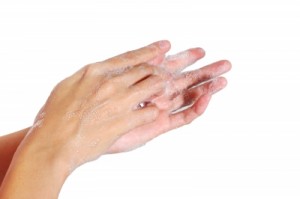Hand washing is arguably the single most important hygiene practice and the cornerstone of good personal as well as food hygiene and a practice of supreme importance in medical safety. Good hand washing will help you avoid many problems such as infections, food poisoning, parasitic diseases as well as many others and will generally help your health and quality of life.
Specifically, hand washing is particularly crucial when it comes to attending babies and infants, when doing any medical tasks such as dressing a wound, before coming to contact with food, after coming in contact with animals, after using a toilet and whenever there is visible dirt and unclean substances to be found on our hands.
 Hand washing is the cornerstone of personal hygiene (Image: wandee007 / FreeDigitalPhotos.net)
Hand washing is the cornerstone of personal hygiene (Image: wandee007 / FreeDigitalPhotos.net)
Proper Hand Washing
Hand washing with water alone is inefficient as water is unable to remove most organic components such as proteins and fats. Using warm instead of cold water makes no difference on the bacterial load on our hands. To put it simply; using cold or warm water to wash your hands is just a matter of personal preference, rather a matter of proper hygiene.
To make hand washing effective enough to kill microorganisms you need to use soaps or detergents (actually most modern “soaps” are in fact detergents) and of course a dry, clean towel after you are done.
Hand washing should not be rushed. Mix the soap with the water and then carefully rub the fingers, the nails, the palms, the back of the hands and finally the wrists. Special attention must be given to the nails as well as the wrists in order to achieve good personal hygiene as these are frequently missed when we habitually wash our hands. Finally, rinse with plentiful water and dry your hands thoroughly using a dry, clean towel.
Remember that bacteria can reside on used towels as well as solid soaps. To make sure that solid soaps are safe and free from bacteria, rub them gently and rinse off the foam before using them.
Many people choose to use antibacterial soaps for their hand washing. Even though they have been proven to be effective in reducing bacterial populations, studies have shown that plain soaps seem to be as effective as most antibacterial soaps found in the market today.
Hand Antiseptics
Hand antiseptics are non-water-based hand hygiene products that can be used to supplement hand washing but never as an alternative to avoid proper hand washing. It has been proven beyond any doubt that hand antiseptics are effective in killing any germs that might be found on our hands.
Be warned though, that excessive use of hand antiseptics might irritate or even damage the skin on your hands.
Hand Washing and Food
As we have said in our “Food Safety and Food Hygiene Basics” and “Food Preparation and Proper Food Handling” articles, people should wash their hands before coming in contact with food. This holds true not only before eating the food but as well as preparing it.
Contrary to popular belief, many bacteria and other harmful agents and food hygiene hazards(such as toxins) are not destroyed by many cooking procedures ,so it is imperative not to contaminate the food we are preparing with harmful agents that could be consumed later on, causing health problem.
For more information on the various food hygiene hazards, take a look on our smashing “Food Hygiene Hazards and how to avoid them 101 From bread mold to killer neurotoxins.” article and this authoritative CDC report.
